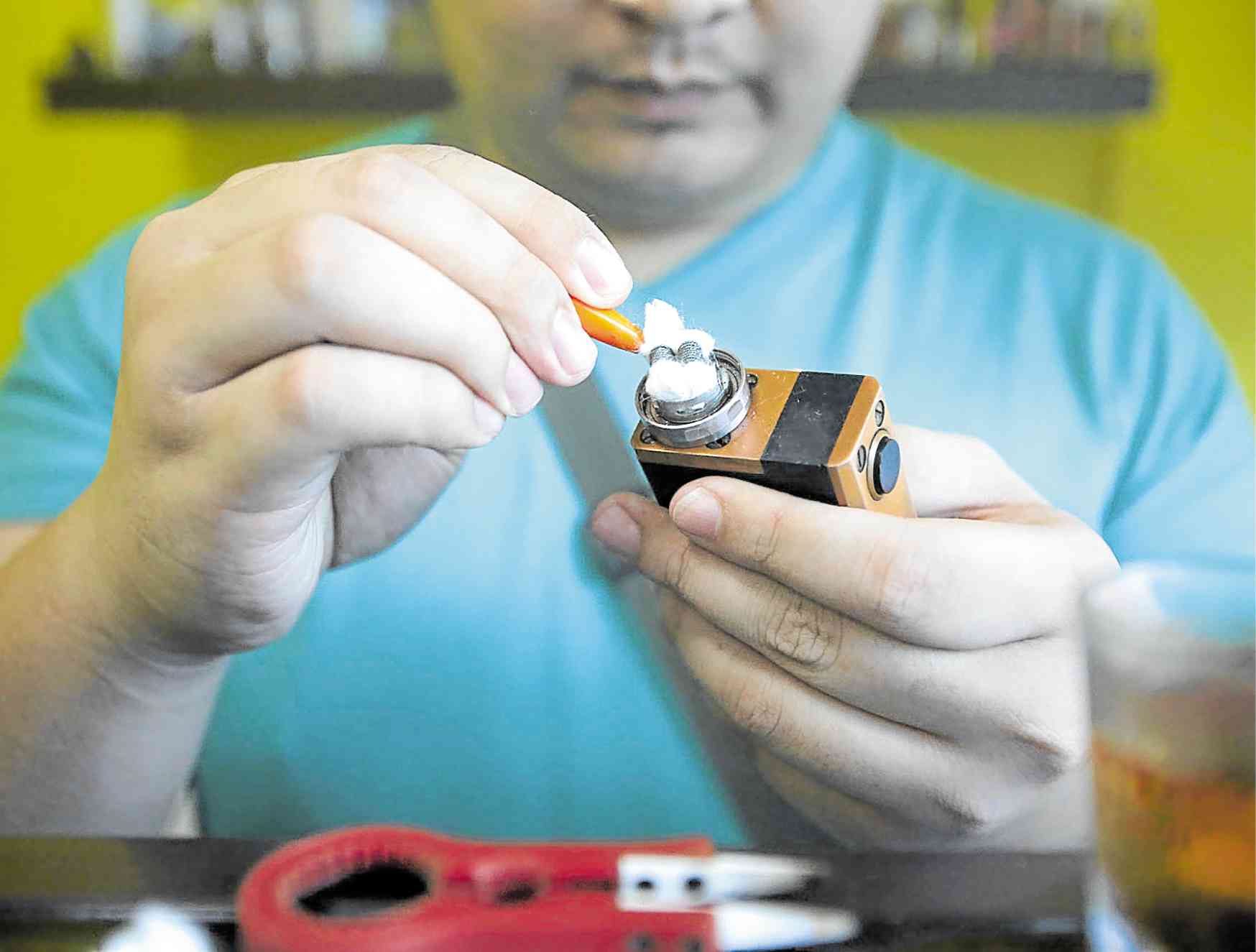
LEGAL BASIS A two-year-old executive order will be the legal basis of the Philippine National Police in enforcing PresidentDuterte’s verbal directive to arrest those who vape in public places. —RICHARD A. REYES
The Philippine National Police will implement an arrest-and-release policy on violators of President Duterte’s order banning the use electronic cigarettes (e-cigarettes) or vaping devices in public.
Lt. Gen. Archie Gamboa, the acting PNP chief, on Thursday said the two-year-old Executive Order No. 26, which provides for a “smoke-free environment in public and enclosed places,” would be the legal basis for the police action against vapers in public.
The police are allowed to make arrests in compliance with EO 26 because of “a higher interest to protect, which is public health,” he said, adding that the order was intended to implement the Clean Air Act and regulate tobacco.
“If you include vape in that EO, it’s actually an expansion of the definition of smoking, that’s why we can implement it immediately,” Gamboa said.
In the absence of the required publication of an executive order specifically against vaping, he conceded that violators could not be penalized.
“That’s why I told them [police officers], ‘Arrest [violators], put them on the blotter and then release them,’” Gamboa said.
Punishment later
“Arrest is not punishment, remember,” he added. “Punishment comes after arrest, after due process.”
He indicated that those arrested need not worry about having a police record because a blotter entry had no “probative value,” could not be used in court and “cannot prejudice a person later on.”
He warned the public, however, “not to challenge us.”
“It’s very simple, let’s not use vape. If you want to use vape, use it in private places not public places. That’s our only request, that’s why we do not even implement punishments,” Gamboa said.
Bohol action
In Bohol, however, Col. Jonathan Cabal, PNP provincial chief, on Wednesday directed his men to confiscate e-cigarettes used in public places instead of arresting violators of the President’s order.
In the verbal order he issued on Tuesday night, the President admitted that “there was no executive order yet” banning e-cigarettes in public, saying “the legal papers will follow.”
He also banned the importation of e-cigarette products, but this also was not covered by any specific order.
He said he had directed the authorities to “not seize but just hold” the importations.
“And they said, what’s the law? Never mind the law. The law will come. Tell them … I ordered it,” he said.
Warning to judges
“The order will come. Do not worry. Just stop it. And the police, do your work. The Armed Forces, do your work. I will take full responsibility alone,” he added.
Mr. Duterte also warned judges not to block his order, but did not say how he would respond if they did.
Domingo Cayosa, president of the Integrated Bar of the Philippines, said he did not believe judges would allow themselves to be intimidated by Mr. Duterte’s warning.
“The Constitution guarantees the separation of powers,” he said in a television interview on Thursday. “But at the end of the day, any citizen who feels aggrieved can actually go to the courts.”
Cayosa also advised those who might be arrested to file a case in court to challenge the legality of their arrest.
Sen. Panfilo Lacson, a former PNP chief, on Thursday reminded his former subordinates that the policy of arresting people who vape in public should be clearly spelled out in an executive order.
But he said that while several of the President’s actions had been criticized, some had benefited the public like the six-month closure and rehabilitation of the world famous Boracay Island.
“I’m also a Machiavellian. The result is more important for me than all the niceties. A positive result is much better,” Lacson said.
Official regulation
Senate President Pro Tempore Ralph Recto, an e-cigarette user, said he believed Mr. Duterte could not issue a ban without any official regulation.
“Could he ban alcohol? Regulate, he can,” Recto said in a text message to the Inquirer.
“There are e-cigarettes that are 90 to 95 (percent) less harmful (than tobacco). Banning it will not create any revenues,” he added.
Senate President Vicente Sotto III agreed with Recto, saying a prohibition on vaping “may need an ordinance to ban it in a specific place or a law for nationwide coverage.”
“Right now, it is debatable if an executive order will suffice. Except that it’s annoying, a clear public health harm has yet to be proven,” Sotto said.
The President issued his order just days after the Department of Health reported the country’s first case of lung injury associated with e-cigarette, or vaping—a 16-year-old girl who suffered from a severe breathing problem after vaping daily since March.
In Cebu City where the unidentified girl was hospitalized, Councilor Joel Garganera said he would file next week a proposed ordinance to regulate vaping, ban e-cigarettes from public places and prohibit minors from using them.
Vape shops would also be required to post health warnings and none of them would be allowed near schools.
He said he would not encourage new users and the “curious” to even try it.—WITH REPORTS FROM MARLON RAMOS, TINA G. SANTOS AND DALE G. ISRAEL

